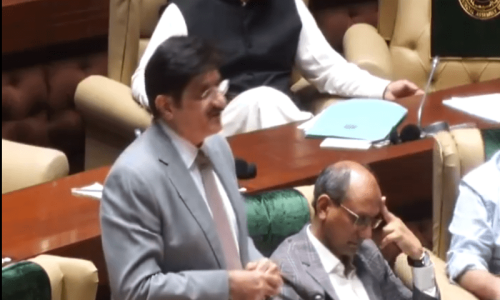KARACHI: The absence of an efficient transport system in Karachi is a grave problem, which is bound to worsen in the coming years in the face of the city’s growing population, and the inhabitants have little chance to get any relief unless the government establishes the writ of law, and sets up and strengthens institutions.
This was the gist of most speakers’ views expressed at a seminar on Wednesday on the city campus of the NED University of Engineering and Technology. Titled ‘Transportation issues in Karachi and bus rapid transit proposals’, the event was organised by the architecture and planning department of the NED university and the Urban Resource Centre.
Giving a presentation on the subject, Ashar H. Lodi, a traffic engineer working as the director of Exponent Engineering Pvt Limited, highlighted why it was important to give a priority to transport.
Citing some statistics, he said Karachi’s population was growing fast and it was estimated that the city would become one of the largest cities in the world by 2030.
“But is the government geared for that? Does it have enough resources to cater to the needs of the growing population?” he said.
‘Public transport routes fallen from 252 to 149 in 10 years’
Sharing his observations, he said the city was experiencing a massive infrastructural change with multistorey buildings being erected on the grounds of individual houses, and there was much more to follow as major residential-cum-commercial projects were planned on the city’s outskirts.
“The inner core of the city is witnessing population densification while the outer core would also experience a similar pattern,” he said, adding that the city was growing both vertically and horizontally.
Linking population growth with transport, he said the city had also seen an increase in private vehicles. But the number of public transport had instead decreased dramatically with the closure of registered public transport routes from 252 in 2005 to 149. The operational routes in 2015 were, however, 101.
“The lack of public transport led to an increase in the use of motorbikes (its registration increased from 5.8 per cent in 2005 to 12pc in 2010) and Qingqi rickshaws.
“If we let the present situation continue, it will get out of hand and we will be in a big mess. The vehicle ownership rate has to be brought down,” he said.
Citing a 2008 survey, he said that the major concerns of public transport commuters were found lacking security and fare level.
Discussing mass transit options for Karachi, he said one could learn from other countries that had a combination of mass transit systems in place that included light rapid transit, trams, monorail and bus rapid transit (BRT), which was at present under consideration by the government.
The BRT, he explained, was not the solution to all transport woes. In fact, the project had many challenges. “These relate to revamping the existing public transport and bringing relevant stakeholders on board, developing a regulatory body for an integrated operation, introducing a fully interoperable fare collection system and a unified mechanism for subsidy as the BRT is highly subsidised the world over.”
On the Karachi Circular Railway, he said a host of issues were linked to the project and it was unlikely to be initiated any time soon.
The presentation was followed by a question-answer session during which a shared concern was poor governance. “The proposals under the government’s consideration may take 15 to 20 years to complete. Projects like the BRT require institutions and coordination within institutions, both of which don’t exist in our case,” said architect Arif Hasan in his brief remarks.Citizens should build up pressure on the government for setting up a system for governance and establishing institutions, he said.
Published in Dawn, November 12th, 2015















































